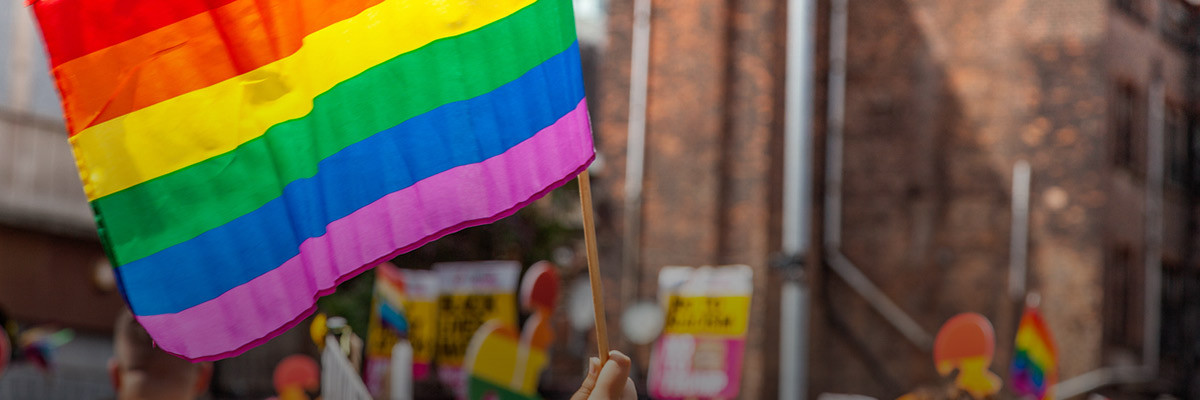
In 2019, lesbian, gay, bisexual, transgender, and intersex (LGBTI) communities around the world filled city streets for LGBTI Pride in commemoration of the 50th anniversary of the Stonewall Riots, one of the most important events contributing to the launch of the gay liberation movement and the fight for LGBTI rights in the United States.
In stark contrast, this year’s Pride festivities have been canceled or moved to virtual platforms due to the COVID-19 pandemic, and LGBTI communities, like other vulnerable groups, have been hit hard by the crisis. While Pride is now synonymous with festive celebrations and has become a staple of mainstream and corporate culture, it began as a series of riots led by trans women of color against police brutality and racial, gender, and sexual orientation discrimination.
As we celebrate Pride Month in 2020, with protests against brutal police violence and racial discrimination against Black people erupting around the world, it is more important than ever to recognize the struggles of disenfranchised communities all over the world and the interconnectedness of these struggles for justice and equality.
But first, some good news. On June 15, 2020, the U.S. Supreme Court held that LGBTI people are protected from workplace discrimination under the Civil Rights Act of 1964, ruling against the Trump administration, which sought to exclude sexual orientation from protected classes. This resounding victory for LGBTI rights is consistent with international human rights principles, particularly those articulated in the UN Guiding Principles on Business and Human Rights (the UN Guiding Principles) and the UN Standards of Conduct for Business Tackling Discrimination Against LGBTI People (the UN Standards). It also affirms the important work the private sector is doing and must continue to do to create inclusive environments for LGBTI employees, customers, and communities wherever they do business.
Which brings us to the bad news. Despite a lot of good work to address inclusivity by the private sector, LGBTI communities around the world remain as vulnerable as ever. COVID-19 has exposed many of the structural and systemic issues disproportionately impacting vulnerable populations, including people of color, LGBTI people, migrants, and more, who were hit hardest by COVID-19. The LGBTI community, for example, suffered from limited access to and deprioritization of healthcare services, stigma and discrimination, violence and abuse, and a decrease in access to work during this crisis, as highlighted by the UN Office of the High Commissioner for Human Rights. These factors existed prior to the pandemic but were quickly exacerbated as LGBTI people sought protections and support during the crisis.
In response to the severe impact of COVID-19 on LGBTI communities around the world, the Partnership for Global LGBTI Equality (PGLE), a collaborative initiative of BSR in partnership with the World Economic Forum and UN Human Rights, along with our NGO partner OutRight Action International, launched the COVID-19 Global LGBTIQ Emergency Fund. Established by OutRight, the Fund supports LGBTI organizations on the frontlines of the pandemic in the global South, addressing a range of humanitarian needs such as emergency food and/or shelter, access to safe and competent healthcare, safety and security, and financial stability.
The Fund will continue its efforts to mobilize the private sector to support this effort throughout Pride Month and beyond, giving companies an opportunity to reallocate resources in light of cancelled Pride events. Prioritizing financial support to LGBTI communities and advocating on their behalf are concrete steps that the business community can take to empower LGBTI movement leaders and ultimately ensure the survival and long-term viability of local partners leading the grassroots effort to tackle discrimination against the LGBTI community.
Contributing to this emergency relief fund is another way companies can fulfil their commitments under the UN Standards, in particular Standard 5, “Act in the Public Sphere.” PGLE’s mandate is to help companies implement these standards and take action to meet the expectations which they articulate, which include supporting LGBTI communities around the world. And in light of the U.S. Supreme Court’s recent ruling, it is as important as ever for the private sector to ensure it is promoting inclusivity of and eliminating discrimination against LGBTI people. Companies interested in becoming supporters of the UN Standards can visit the PGLE website to learn more.
The private sector has an opportunity to drive impactful change for LGBTI people around the world, particularly during the ongoing COVID-19 crisis and the civil unrest as people rally and demand an end to racial injustice and police violence around the world. We have an opportunity to mobilize a different kind of Pride campaign this year, one focused on fulfilling the vision of the UN Standards and providing essential financial support in a time where LGBTI communities and nonprofits are facing an acute threat to their health and well-being. For millions, Pride has always been a celebration of survival from persecution and discrimination. This year, the sentiment is even more urgent, and we all must come together to strengthen our commitment and work towards a more inclusive, tolerant, and supportive world for all.
Topics
Collaborative Initiatives
Let’s talk about how BSR can help you to transform your business and achieve your sustainability goals.








